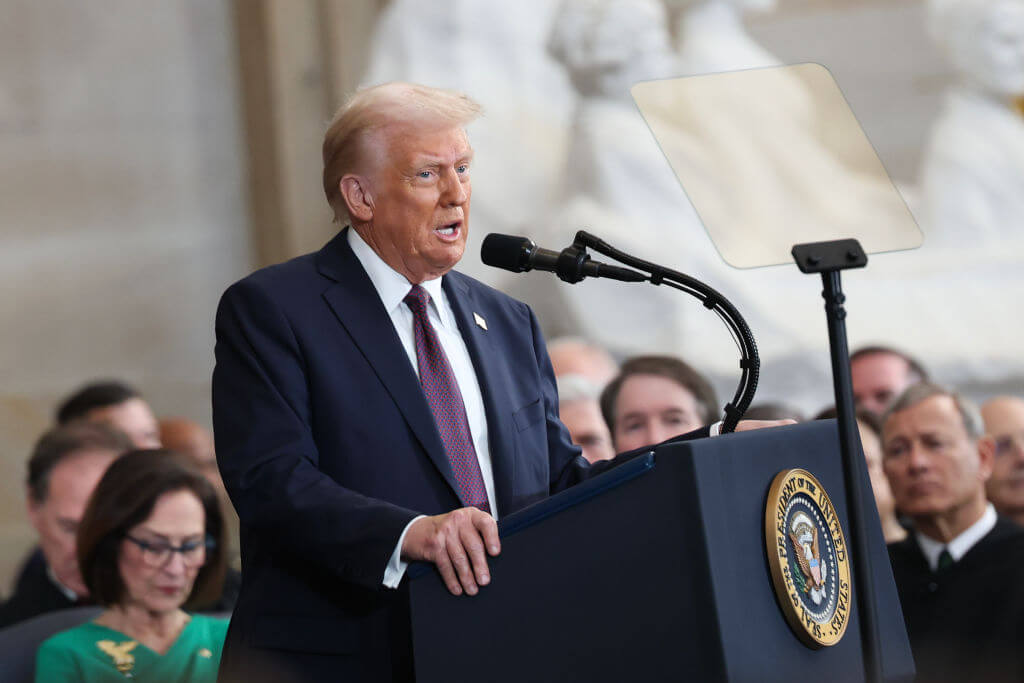[ad_1]

Trump speaks during his inauguration Jan. 20. Photo by Kevin Dietsch/Getty Images
In his inaugural address after being sworn in Monday, President Donald Trump highlighted the release of three Israeli hostages the day before and the beginning of a ceasefire in Gaza as an emblem of a theme for his second presidency: world peace.
“My proudest legacy will be that of a peacemaker and unifier,” said Trump, whose Jewish golfing buddy helped bring a deal designed by President Joe Biden over the finish line. “That’s what I want to be — a peacemaker.”
The foreign policy section of Trump’s speech lacked detail but included hints of how he plans to handle the crisis in the Middle East. “We will measure our success not only by the battles we win but also by the wars we end,” he said, “and, perhaps most importantly, the wars we never get into.”
Because of the cold and snow, the ceremony was held inside — in the Capitol Rotunda, a remarkable symbol of Trump’s return to power four years after rioters denying his electoral loss overran it on Jan. 6, 2021.
In his remarks, Trump outlined his America First agenda, describing it as a departure from Biden’s foreign policy and saying he would lead a nation that is admired and respected. With Biden only feet away, sitting with his head lowered, Trump criticized him for “stumbling into a continuing catalog of catastrophic events abroad” and for leading “a government that has given unlimited funding to the defense of foreign borders but refuses to defend American borders.”
On his first day in office, Trump is reportedly expected to sign an executive order that permanently freezes U.S. funding of the United Nations Relief and Works Agency (UNRWA). The Biden administration paused funding for the U.N. agency that helps distribute aid in Gaza last January after Israel provided evidence that at least a dozen of UNRWA’s 13,000 staffers in Gaza received orders from Hamas and took part in the kidnapping and killing on Oct. 7. UNRWA Commissioner General Philippe Lazzarini said he fired several staffers while the agency investigated the evidence provided by Israel.
Trump halted all funding to UNRWA in 2018.
More highlights
The speech and ceremony were laced with religious speeches, songs and symbolism. Trump himself mentioned God several times in his 30-minute address. “I was saved by God to make America great again,” he said, referring to the attempt on his life at a rally in Butler, Pennsylvania, last summer. “We will not forget our country, we will not forget our Constitution, and we will not forget our God.”
In his invocation before the swearing-in, the Rev. Franklin Graham, who leads the Christian humanitarian relief organization Samaritan’s Purse in war zones, prayed that Vice President JD Vance would stand beside Trump “to hold up his arms like Aaron held up the arms of Moses in the midst of battle.” At the Republican convention last July, Graham, the son of famed evangelist Billy Graham, said he wanted to see America as a Christian nation.
The president of Yeshiva University, Rabbi Ari Berman, was one of several clergymen to offer benedictions after the speech. Berman referenced Trump’s campaign slogan and his work on the hostage-ceasefire deal.
“America is called to greatness, to be a beacon of light and a mover of history,” the rabbi said, adding that Trump “acutely feels” the pain of the families of the Israeli and American hostages held by Hamas in Gaza. “We are so thankful for the three young women who yesterday returned home and pray that the next four years bring peace to Israel and throughout the Middle East.”
Berman also mentioned the pro-Palestinian protests at colleges across the nation since the war in Gaza that started with the Oct. 7 Hamas terror attacks on Israel. “Guide our schools and college campuses, which have been experiencing such unrest, to inspire the next generation to pair progress with purpose, knowledge with wisdom, and truth with virtue,” he said.

I hope you appreciated this article. Before you go, I’d like to ask you to please support the Forward’s award-winning, nonprofit journalism so that we can be prepared for whatever news 2025 brings.
At a time when other newsrooms are closing or cutting back, the Forward has removed its paywall and invested additional resources to report on the ground from Israel and around the U.S. on the impact of the war, rising antisemitism and polarized discourse.
Readers like you make it all possible. Support our work by becoming a Forward Member and connect with our journalism and your community.
— Rachel Fishman Feddersen, Publisher and CEO
With your support, we’ll be ready for whatever 2025 brings.
[ad_2]
Source link


